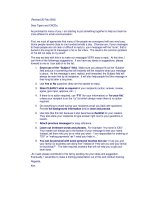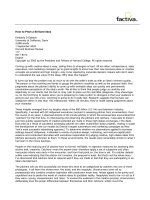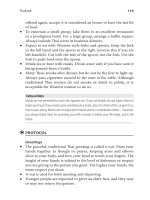Tài liệu How To Negotiate An Increase pptx
Bạn đang xem bản rút gọn của tài liệu. Xem và tải ngay bản đầy đủ của tài liệu tại đây (89.37 KB, 2 trang )
How To Negotiate An Increase
By Robert Moskowitz
Sure, your boss or Board of Directors might call you in and offer you a raise. But chances are
overwhelming that they won't. So if you want to earn more money next year than last, you'll have to
initiate the process yourself, and use all your skills to pry loose a little extra.
It's not easy to accomplish, however, In fact, annual increases in base salaries are averaging only 3%,
the lowest amount in more than 20 years, according to Christine Seltz, spokesperson for Hewitt
Associates, a nationally known compensation consulting firm based in Lincolnshire, IL.
Fortunately, about two-thirds of the nation's employers offer incentive pay for top performers. If you can
work your way into this type of program, you'll receive extra pay or other benefits whenever you achieve
specific performance targets. Depending on the specifics of your situation, these performance targets
might cover just you or your entire team.
Either way, however, incentives can provide much bigger take-home pay increases than conventional
raises. Hewitt Associates' surveys show that today's budgets for incentive programs presently average
about 7% of the budget for base compensation (that is, salaries). This means incentives provide more
than twice as big a pie as raises from which to cut yourself a juicy slice.
Here are some strategic and tactical tips on how to increase your take home pay in the coming twelve
months.
Strategic Approaches
1. Determine your worth in the marketplace. Contact the competition, clip and save relevant
employment ads, even talk to executive search firms. You might also look for references and
facts in magazine articles and compensation surveys that support your idea that you should earn
more.
Be prepared for a happy surprise, especially if you've been working for the same company for
several years. There is often a large discrepancy between your present salary and what the
market says people with comparable skills and experience can earn. Many people simply don't
know what they're worth.
If you're already getting what the market says you're worth, don't give up on getting more.
2. Consider how to become more valuable to your employer. As business fashions and thinking
changes, different departments become "hot" and are deemed worthy of fatter paychecks. For
example, today marketing or finance might be better places to earn the big bucks than
manufacturing or customer service.
If you can't switch career tracks so quickly, you still might be able to take on additional
responsibilities, or even discover totally new issues and projects that will make you more
valuable to the company. Take advantage of the "cross training" mentality that's popular today.
At the highest levels, employers nearly always prefer executives who bring a broad-based
perspective to their work and the company's mission.
If your present employer doesn't place extra value on a broader range of skills and knowledge,
your cross-training efforts will still make you more valuable to your next employer.
3. Feel good about asking for a raise, and don't worry about getting canned. "The threat of firing
you for wanting too much is nothing but a psychological bluff," says Lawrence D. Schwimmer,
author of "How To Ask For A Raise Without Getting Fired," now a top manager with Geneva
Corporation, a San Francisco acquisitions and mergers firm. "Even a stupid boss knows the cost
of hiring and training your replacement is much more than the raise you're asking for,"
Schwimmer counsels, "so don't weaken yourself by imagining the worst."
4. Phrase your request assertively, not aggressively. Leave out any "or else" threats, no matter
how emotionally satisfying. This allows you to save face if your request is denied. You can take
time to think things over, and either make plans to leave or make clear that you've decided you
like your job and your firm so much you'll stay and see about getting a raise later on.
5. Anticipate the objections, worries, or problems your request might generate, and incorporate
the top three or four in your initial statement. Done right, this approach can "take the wind out of
their sails" and make it harder for your employer to say "no." Be careful, though, if you bring up
really powerful reasons for refusing you a raise, you might be providing the opposition with
unbeatable arguments.
6. Set limits: Don't ask for a raise in general, but for a raise of a certain size. Don't allow an open-
ended time limit on getting a response; ask to be informed within two weeks.
Tactical Approaches
1. Base your request for a raise on performance. Arguments about pay equity, reference to the
many years since your last raise, pleas for compassion because you have big expenses coming
up none of these fly very well in today's economy.
2. "Bring solid documentation of what you've done to help the company," suggests Schwimmer,
"and, anticipating that you'll refer to your performance when you ask for a raise, keep a file to
document your level of performance during the most recent year or six months."
3. Be assertive in your request. Don't hint or allude to what you want. Communicate honestly and
directly in an appropriate manner. "In fact," says Schwimmer, "you might want to ask for twice as
much as you think you're going to get, so you can negotiate down to an acceptable level."
4. Role play your request before you make it. Try talking about what you've done to merit a raise
to yourself in a mirror, or while driving alone. Having said the words many times before, you will
probably ask for the increase more confidently and articulately when it counts.
5. Negotiate for perks and travel benefits, not just salary. For example, get permission to attend
seminars and training sessions in areas of interest that lie outside your present job description.
Or negotiate for paid leave so you can have more frequent 3-day weekends. Ask for a car
allowance. Three out of four times that an increase is in order, say the experts, such a request is
met with some concession.









